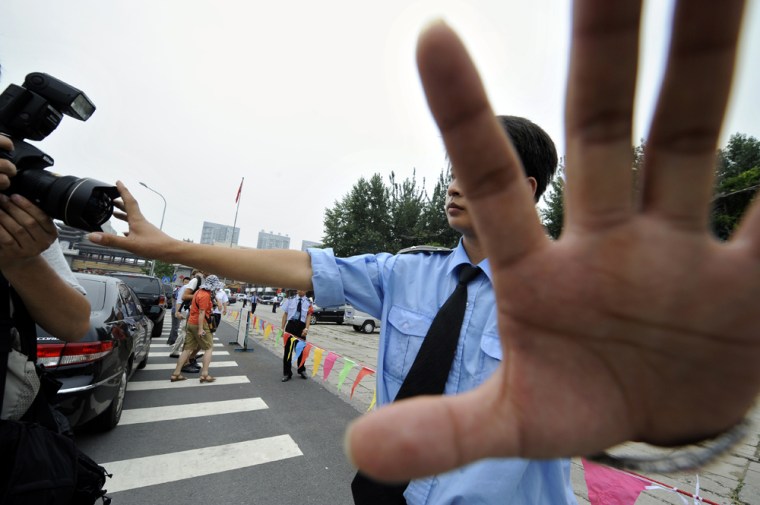Over at the media village, China is battering them with petty kindnesses.
There’s one person to open the door to the cafeteria where breakfast is served, and two more to sort journalistic recycling from journalistic trash. There are people to guide the press onto special buses. There are flower-arranging demonstrations (mostly ignored) at the main media press center, just off the Olympic Green, and free afternoon coffee and cookies (well-attended).
Security sweeps are gauntlets of politeness, where the “good-morning’s” and “please’s” rain down from teams of smiling Olympic staffers in matching blue Olympic outfits.
China has a long history of difficult relations with the foreign media, and has long heavily restricted press access to sensitive stories. But the past week also makes clear that Beijing wants to keep those journalists happy while they cover the Olympic games.
Those sensitive stories, though, are still clearly out of bounds.
On Wednesday, a British television journalist was detained by police as he tried to report on a pro-Tibet protest near the green, where protesters handcuffed themselves together and hung a “Free Tibet” banner from a bridge. John Ray of London-based ITV News was grabbed by police and put into a car. He was released after proving he was a journalist.
International Olympic Committee spokeswoman Emmanuelle Moreau said the committee was checking into what happened. “The IOC’s position is clear: the media must be free to report on the Olympic Games,” she said in a statement.
While Beijing vowed before the Olympics to give the foreign media unrestricted access to China during the games, Ray’s detention was just the latest in a string of recent confrontations between Chinese authorities and international journalists, adding to worries that Beijing has reverted to the tight controls it normally keeps over the press.
Late last month, Chinese police shoved and kicked a crowd of 30,000 people who had waited in the heat for up to two days hoping to get a chance to buy Olympic tickets. Hong Kong television showed several journalists pushing back against police, and Hong Kong Cable TV showed a policeman putting his arm around the neck of one of their reporters and pulling him to the ground.
Last week, two Japanese journalists were briefly detained and beaten by police in western China, triggering a protest by the Japanese government. Chinese officials later apologized. The journalists were working in Xinjiang province at the scene of a deadly attack on Chinese policemen when they were forcibly taken to a border police facility, said a reporter for Japanese broadcaster Nippon Television Network Corp.
While China has long been anxious to use the Olympics as a chance to show its emergence as a global superpower, such reactions also reflect Beijing’s efforts to carefully script the games and how journalists cover them.
Olympic freebies and flower-arranging amount to nothing substantive, said Bob Dietz of the New York-based Committee to Protect Journalists. “The easy stuff ... is easy” he said. “This is China turning on its hospitality and welcoming people, and it isn’t just journalists getting the red-carpet treatment.
“On the substantive issues, there hasn’t been much movement at all,” he said. “The one human rights pledge that China made was that there would be a free media for the games — and that just hasn’t materialized.”
So coverage of athletes and gold medal face-offs are acceptable. But stories about pro-Tibet protests — even on the edge of the main Olympic venues — are off-limits.
“I can give you a general principle: That is, the Chinese government adopts a positive and open attitude and welcomes foreign journalists coming to China and report on the Beijing Olympics,” Qin Gang, a Chinese Foreign Ministry spokesman, said at a regular briefing Wednesday. He said Chinese officials were “very concerned” about reports of what had happened to the Japanese journalists, but added that: “Local officials have the right to take some measures.”
Chinese authorities have been particularly sensitive about Tibet since bloody anti-government protests in March in the region’s capital and surrounding provinces.
While foreign journalists regularly face troubles reporting in China, the situation is far worse for Chinese reporters who aggressive cover sensitive topics ranging from official corruption to human rights.
At least 26 Chinese journalists are in prison in China for their work, the New York-based Committee to Protect Journalists said in a statement earlier this year. According to a February report by the Paris-based Reporters Without Borders, China jails the largest number of journalists, cyber dissidents, Internet users and activists for freedom of expression.
